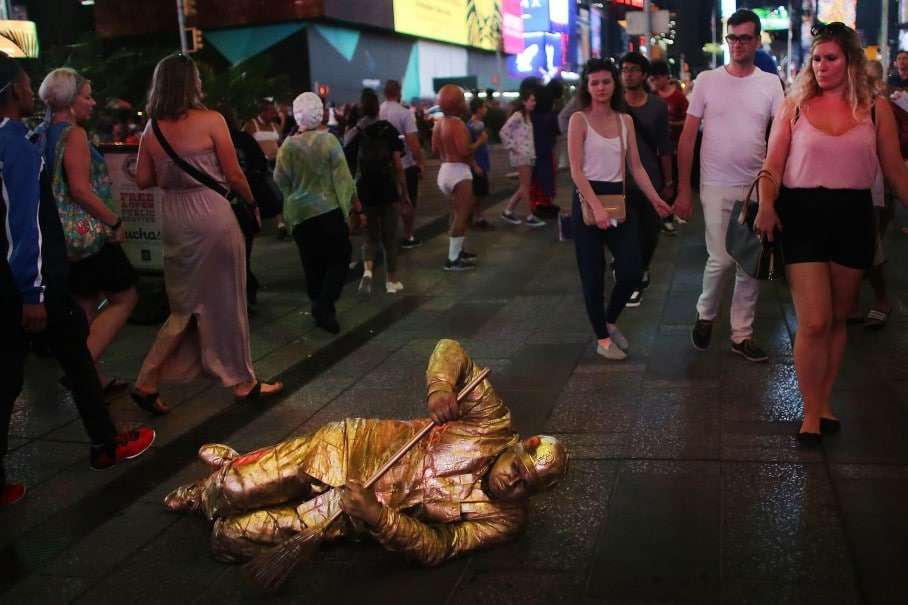The Volokh Conspiracy
Mostly law professors | Sometimes contrarian | Often libertarian | Always independent
Can New York ban commercial toplessness in Times Square?

The AP reported last week,
New York Gov. Andrew Cuomo says women posing nearly naked for photos in Times Square [in exchange for cash from tourists] are breaking the law and undermining efforts to keep the tourist area family friendly….
Mayor Bill de Blasio said Tuesday that he believes the practice is "wrong" and that the city will take action.
The New York Times's Colleen Wright has more, and notes that the women are often colorfully body-painted in various designs (which might be relevant to item 3 below). May New York enforce public nudity laws in such situations?
1. There's no First Amendment problem with enforcing public nudity laws, the Supreme Court has told us, even in strip joints where the viewers are eager to see the nudity, see Barnes v. Glen Theatre, Inc. (1991). Banning public nudity would be even more clearly constitutional if the ban applies to public places where many viewers would be offended. Interestingly, bans on the public display of films, photographs, pictures, or sculptures that display nudity are unconstitutional (see Erznoznik v. City of Jacksonville (1975)), but that doesn't apply to bans on real in-the-flesh nudity.
2. What about the Equal Protection Clause, which generally (but not always) bans governmental sex discrimination? When New York's highest court considered the issue in People v. Santorelli (1992), two of the six judges who participated in the case would have concluded that the ban violated the Equal Protection Clause. But the other four judges didn't reach that question, instead reading the law narrowly (see below); and many state and federal court decisions since the 1990s have upheld such no-female-toplessness laws against Equal Protection Clause challenge, on the grounds that there are sufficiently real and important differences in human sexual reaction (or at least human sexual reaction within our society) to male and female toplessness. See, e.g., Frandsen v. County of Brevard (Fla. Ct. App. 2001); C.T. v. State (Ind. Ct. App. 2010); State v. Vogt (N.J. App. Div. 2001); City of Albuquerque v. Sachs (N.M. 2004); Schleuter v. City of Fort Worth (Tex. Ct. App. 1997); Buzzetti v. City of New York (2d Cir. 1998); United States v. Biocic (4th Cir. 1991); Hang On, Inc. v. City of Arlington (5th Cir. 1995); Ways v. City of Lincoln (8th Cir. 2003).
The question isn't open and shut: What two New York high court judges thought in 1992 might persuade four judges (the requisite majority) today. Still, the weight of precedent is in favor of concluding that these restrictions on female toplessness are constitutional.
3. But does New York law actually ban the toplessness involved here? New York Penal Law § 245.01 provides:
A person is guilty of exposure if he appears in a public place in such a manner that the private or intimate parts of his body are unclothed or exposed. For purposes of this section, the private or intimate parts of a female person shall include that portion of the breast which is below the top of the areola. This section shall not apply to the breastfeeding of infants or to any person entertaining or performing in a play, exhibition, show or entertainment….
Nothing in this section shall prevent the adoption by a city, town or village of a local law prohibiting exposure of a person as herein defined in a public place, at any time, whether or not such person is entertaining or performing in a play, exhibition, show or entertainment.
The Santorelli decision read this narrowly, to exclude "noncommercial" behavior. But appearing naked in public in order to get tips for being photographed with tourists is pretty clearly "commercial."
The interesting statutory question is whether such people are covered by the exception for "any person entertaining or performing in a play, exhibition, show or entertainment." I take it the city would argue that "show or entertainment" is meant to cover things analogous to a "play" or "exhibition": a broader performance that goes beyond just one person's being nude. On the other hand, the challengers would argue that their walking around body-painted though topless for purposes of entertaining tourists (since they only make money through entertainment) is indeed "entertaining or performing in … entertainment." And they might also argue that any reading of the exception that distinguishes "art" from "mere toplessness" or some such would be unconstitutionally vague or content-based.
Note that the second paragraph of the quote from the New York law allows cities to ban public toplessness including in performances; to my knowledge New York City hasn't done so, but perhaps getting such an ordinance enacted would be part of Mayor de Blasio's plan.


Show Comments (0)